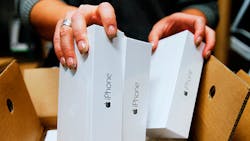Bosch Said to Win Some iPhone Orders in Blow to InvenSense
Robert Bosch GmbH has won orders from Apple Inc. (IW 500/2) to supply the next iPhone with some of its motion sensors, according to a person familiar with the deal, a potential blow to InvenSense Inc., currently the main supplier of those smartphone components.
The change -- hinted at by InvenSense’s finance chief in August -- comes as the San Jose, Calif.-based maker of motion-sensing chips seeks to complete its $1.3 billion sale to TDK Corp., a deal partly aimed at boosting the Japanese company’s business with Apple. InvenSense shares declined more than 5% in extended trading Thursday.
Bosch may supply as much as half of these components for the new iPhone, with InvenSense supplying the rest, the person said. Bosch already supplies barometric pressure sensors for the iPhone, according to product teardowns by iFixit and other firms that analyze the guts of gadgets. Representatives for Apple, InvenSense and Bosch declined to comment. TDK didn’t respond to requests for comment outside of normal business hours in Japan.
The risks of losing Apple as a customer were recently highlighted by chip developer Imagination Technologies Plc., which said in April that the iPhone maker would stop using its intellectual property within two years. The U.K. company’s stock plunged as much as 69%.
Two Suppliers Per Component
Apple Chief Executive Officer Tim Cook tries to source components from at least two suppliers, making it easier to negotiate cheaper prices. Apple accounts for about 60% of InvenSense revenue, according to Bloomberg supply chain analysis.
Apple is expected to unveil a major upgrade to the iPhone later this year to mark the 10th anniversary of the groundbreaking device. Analysts expect consumers to buy millions of the new gadgets, generating huge orders for component suppliers.
The components produced by Bosch and InvenSense contain gyroscopes and accelerometers. Gyroscopes can tell if a phone is being held horizontally or vertically, being shaken, or pointing in a particular direction. An accelerometer detects different movements, such as side-to-side motion. Together, the sensors help measure step count, and they’re useful for mobile games and augmented reality applications. In the iPhone 6S and iPhone 7, these were supplied exclusively by InvenSense, according to teardowns.
Once Dominant
InvenSense Chief Financial Officer Mark Dentinger said at an August investor conference that as recently as 2014 it was dominant "by a considerable margin" at the top end of the smartphone market.
“We’re still the largest player, but we are splitting some share now with our primary competitor,” he added. “Historically, it’s unlikely that most of our customers will have just one supplier over a long, long period of time.”
TDK, which rose to prominence on cassette tapes in the 1970s, has since expanded into batteries, automotive components and now the Internet of Things. The Tokyo-based company received regulatory clearance to acquire InvenSense on April 18.
Apple was already one of TDK’s biggest customers before the Japanese company agreed to buy InvenSense in December. “We aim to become a strong player in the sensor business with InvenSense as our perfect partner,” TDK CEO Shigenao Ishiguro said at the time.
By Alex Webb and Ian King
About the Author
Bloomberg
Licensed content from Bloomberg, copyright 2016.
